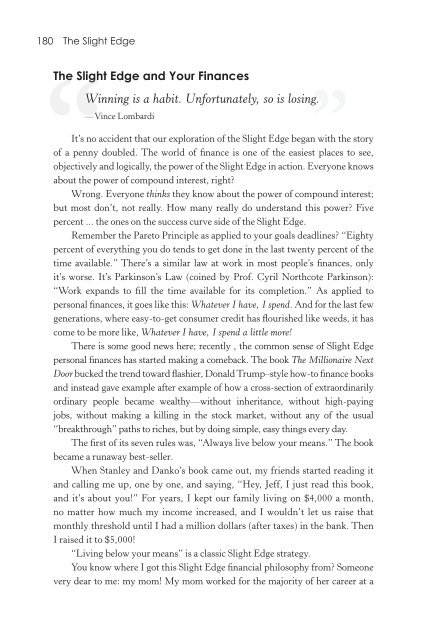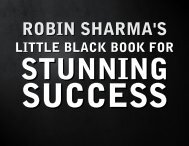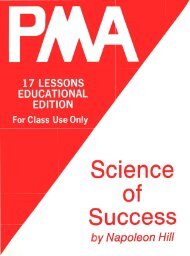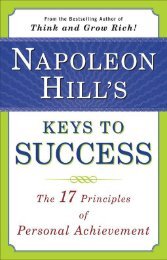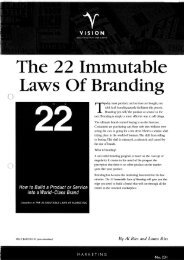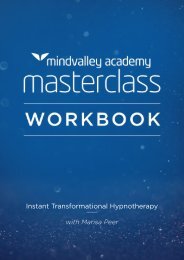The-Slight-Edge
Create successful ePaper yourself
Turn your PDF publications into a flip-book with our unique Google optimized e-Paper software.
180 <strong>The</strong> <strong>Slight</strong> <strong>Edge</strong><br />
<strong>The</strong> <strong>Slight</strong> <strong>Edge</strong> and Your Finances<br />
Winning is a habit. Unfortunately, so is losing.<br />
— Vince Lombardi<br />
It’s no accident that our exploration of the <strong>Slight</strong> <strong>Edge</strong> began with the story<br />
of a penny doubled. <strong>The</strong> world of finance is one of the easiest places to see,<br />
objectively and logically, the power of the <strong>Slight</strong> <strong>Edge</strong> in action. Everyone knows<br />
about the power of compound interest, right?<br />
Wrong. Everyone thinks they know about the power of compound interest;<br />
but most don’t, not really. How many really do understand this power? Five<br />
percent ... the ones on the success curve side of the <strong>Slight</strong> <strong>Edge</strong>.<br />
Remember the Pareto Principle as applied to your goals deadlines? “Eighty<br />
percent of everything you do tends to get done in the last twenty percent of the<br />
time available.” <strong>The</strong>re’s a similar law at work in most people’s finances, only<br />
it’s worse. It’s Parkinson’s Law (coined by Prof. Cyril Northcote Parkinson):<br />
“Work expands to fill the time available for its completion.” As applied to<br />
personal finances, it goes like this: Whatever I have, I spend. And for the last few<br />
generations, where easy-to-get consumer credit has flourished like weeds, it has<br />
come to be more like, Whatever I have, I spend a little more!<br />
<strong>The</strong>re is some good news here; recently , the common sense of <strong>Slight</strong> <strong>Edge</strong><br />
personal finances has started making a comeback. <strong>The</strong> book <strong>The</strong> Millionaire Next<br />
Door bucked the trend toward flashier, Donald Trump–style how-to finance books<br />
and instead gave example after example of how a cross-section of extraordinarily<br />
ordinary people became wealthy—without inheritance, without high-paying<br />
jobs, without making a killing in the stock market, without any of the usual<br />
“breakthrough” paths to riches, but by doing simple, easy things every day.<br />
<strong>The</strong> first of its seven rules was, “Always live below your means.” <strong>The</strong> book<br />
became a runaway best-seller.<br />
When Stanley and Danko’s book came out, my friends started reading it<br />
and calling me up, one by one, and saying, “Hey, Jeff, I just read this book,<br />
and it’s about you!” For years, I kept our family living on $4,000 a month,<br />
no matter how much my income increased, and I wouldn’t let us raise that<br />
monthly threshold until I had a million dollars (after taxes) in the bank. <strong>The</strong>n<br />
I raised it to $5,000!<br />
“Living below your means” is a classic <strong>Slight</strong> <strong>Edge</strong> strategy.<br />
You know where I got this <strong>Slight</strong> <strong>Edge</strong> financial philosophy from? Someone<br />
very dear to me: my mom! My mom worked for the majority of her career at a


